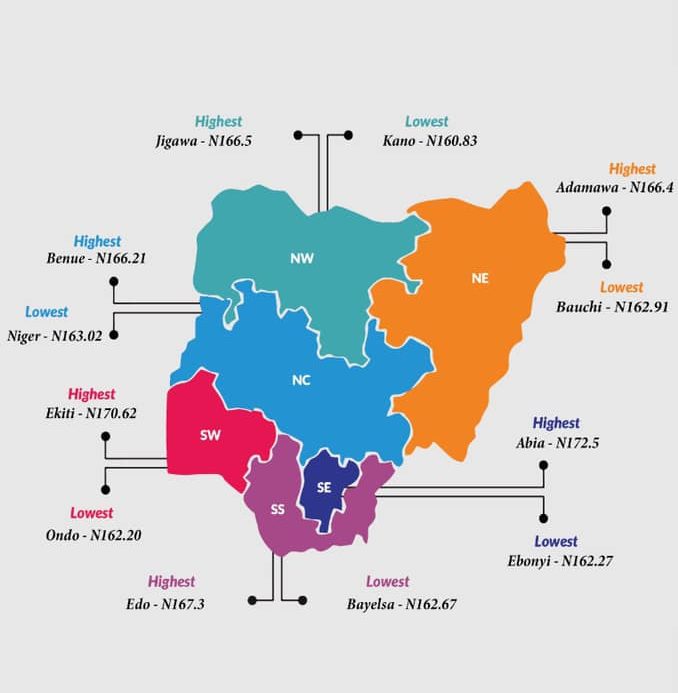The latest pump price watch report by the National Bureau of Statistics revealed that consumers paid the highest for a litre of petrol in Abia, Ekiti and Lagos with ₦172.5, ₦170.62, and ₦167.8 respectively.
According to the report, the average price paid by consumers for premium motor spirit (PMS) commonly called petrol increased by 2.36% year-on-year in September 2021 to ₦164.85 per litre. It, however, recorded a marginal decrease of 0.04% compared to ₦164.91 in the previous month.
Contents
Read also: How to Unleash the Power of Your Mind

Meanwhile, the states with the lowest price of petrol in September 2021, were Ebonyi ( ₦162.27), Ondo ( ₦162.20) and Kano State with ₦160.83.
Average price per state – Sep-21
Abia 172.50
Abuja 164.5
Adamawa 166.40
Akwa Ibom 165.08
Anambra 162.69
Bauchi 162.91
Bayelsa 162.67
Benue 166.21
Borno 164.00
Cross River 165.86
Delta 163.09
Ebonyi 162.27
Edo 167.30
Ekiti 170.62
Enugu 166.67
Gombe 164.40
Imo 167.00
Jigawa 166.50
Kaduna 165.34
Kano 160.83
Katsina 162.68
Kebbi 164.86
Kogi 164.38
Kwara 163.70
Lagos 167.80
Nassarawa 164.50
Niger 163.02
Ogun 165.06
Ondo 162.20
Osun 164.63
Oyo 163.67
Plateau 163.57
Rivers 164.77
Sokoto 165.53
Taraba 163.96
Yobe Fuel 163.82
Zamfara 164.46
We would recall that global prices have surged in recent times, trading above $85 per barrel. So, price of petroleum products continue to rise in the country owing to a positive rally in global crude oil prices, which affect the landing cost of petrol. And, Nigeria’s inability to sufficiently refine its own crude has necessitated the importation of petrol, and caused the country more losses than gains.
“Supply-demand balances show that the market is experiencing a supply deficit, which is spurring deep inventory draws and driving prices upwards,” said Louise Dickson, senior oil markets analyst at Rystad Energy, according to Reuters. “This market tightness is expected to extend into most of 2022, and crude oil supply will only catch up with crude demand by the fourth quarter of next year.”
However, the Nigeria’s Central Bank Governor, Godwin Emefiele, has stated that the Dangote Refinery, proposed to begin operations in 2022, will bridge the gap in the country’s refining capacity. At the investors’ summit held in New York, Emefiele stated that no less than 30% of the nation’s forex spend on the importation of refined petroleum products will be saved when the Dangote Refinery becomes operational.
NBS gives the report after collecting fuel prices across all the 774 local governments across all States and the FCT from over
10,000 respondents and locations, and reflect actual prices households state they actually bought those fuels together with the prices reportedly sold by the fuel suppliers.























